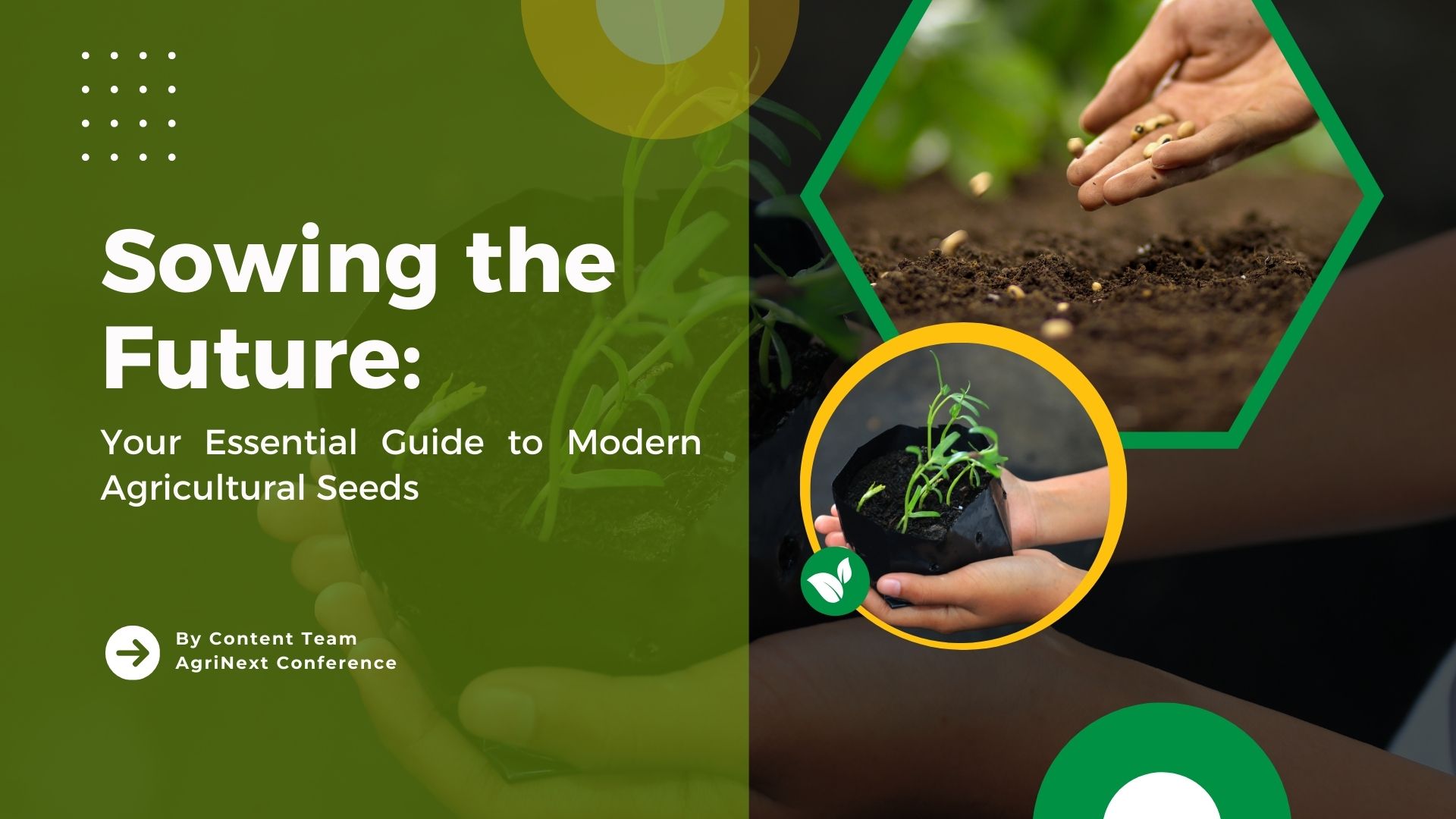
“The future of humanity depends on our ability to feed ourselves. And that starts with a seed.”
Ban Ki-moon, Former Secretary-General of the United Nations
Introduction
Agriculture seeds are the foundation of modern farming, playing a critical role in ensuring global food security. With the world’s population projected to reach 9.7 billion by 2050, the pressure on agricultural systems to produce more food is intensifying, making the demand for high-quality seeds more critical than ever.
Whether you’re a small-scale farmer or a large agricultural enterprise, understanding the importance of seed quality, selection, and sourcing is essential for a successful harvest. This blog will take you through the complex world of agricultural seeds—from their types and benefits to best practices and emerging technologies that are shaping the future of farming.
Understanding the Basics: Seed Types and Their Importance Types of Seeds
Seeds used in agriculture can be broadly categorized into three types:
Hybrid Seeds
Pros: Higher yield, disease resistance, uniformity.
Cons: Cannot be saved and replanted, usually more expensive.
Open-Pollinated Seeds:
Pros: Can be saved and replanted, genetic diversity, often more flavorful.
Cons: Lower yield compared to hybrids, less uniformity.
Genetically Modified (GM) Seeds:
Pros: Pest and herbicide resistance, higher yields, can be tailored for specific conditions.
Cons: Controversial, potential environmental and health concerns, often more expensive and subject to patents.
Ensuring Seed Quality: What to Look For
The success of crops heavily depends on the quality of the seed we plant.
Key factors to consider include
Germination Rate
Percentage of seeds that successfully sprout, indicating seed vitality.
Purity
Absence of contaminants like weed seeds or debris
Vigour
Seed strength, ensuring robust plants under adverse conditions.
Seed Treatment
Seed treatment involves applying protective substances to seeds before planting. This can include chemical treatments to prevent disease or organic methods to enhance growth. Proper treatment ensures that seeds have a better chance of surviving and thriving.
Smart Seed Sourcing: Finding the Right Seeds for Your Farm
Refers to the process of obtaining seeds that are best suited for specific agricultural environments and farming practices. This involves selecting seeds that are genetically diverse, regionally adapted, and sustainable, ensuring the resilience and productivity of crops.
Certified Seeds
Using certified seeds ensures high-quality seed that meets strict standards for purity, germination, and disease resistance.
Where to Source Seeds
Seed Banks: These institutions preserve a wide variety of seeds, making them available to farmers.
Agricultural Extension Services: Government agencies often provide seeds and advice on best practices.
Reputable Seed Companies: Many companies specialize in producing and selling high-quality seeds tailored to different agricultural needs.
Innovations in Seed Technology
Innovation in seed technology is transforming agriculture by introducing advanced methods to enhance seed performance and crop yields. These innovations are helping farmers meet the challenges of a growing population, climate change, and the need for sustainable farming practices.
Genetic Engineering: Modern techniques like CRISPR allow for precise gene editing to create seeds that are more resistant to pests, diseases, and environmental stresses.
Hybrid Seeds: These are developed by cross-pollinating two different parent plants to produce seeds that offer superior traits such as higher yield, uniformity, and disease resistance.
Coated and Treated Seeds: Seed coatings are applied to improve germination rates, provide nutrients, and protect seeds from pests and diseases during the critical early stages of growth.
Drought-Resistant Varieties: Advanced breeding techniques are being used to develop seeds that can withstand periods of low water availability, crucial for farming in arid regions.
Heirloom Seeds Heirloom seeds are becoming increasingly popular among farmers and gardeners looking to preserve plant diversity. These seeds are passed down through generations and are prized for their flavour, hardiness, and genetic variety.
Sustainable Seed Practices
Seed Saving Seed saving is an age-old practice where farmers collect seeds from their crops for future planting. This practice promotes self-sufficiency and helps preserve heirloom and open-pollinated varieties.
Organic Seeds Organic seeds are grown without synthetic chemicals and are often more resilient to pests and diseases. They are essential for organic farming practices, which prioritize environmental sustainability.
Climate-Resilient Seeds As climate change affects growing conditions worldwide, the development of climate-resilient seeds has become critical. These seeds are bred to withstand extreme weather, drought, and other environmental stressors.
Challenges in Seed Production
Intellectual Property Rights The issue of seed patents and intellectual property rights has become a significant challenge for farmers, particularly in developing countries.
For Example
Monsanto’s Roundup Ready Soybeans: Monsanto developed genetically modified soybeans resistant to their Roundup herbicide. They patented the seeds, requiring farmers to purchase new seeds each season, rather than saving and replanting their own.
Seed Monopolies A few multinational companies dominate the global seed market, leading to concerns about monopolistic practices and the erosion of seed diversity.
For Example
DuPont-Pioneer: DuPont’s subsidiary, Pioneer Hi-Bred, is one of the largest seed companies in the world, controlling a significant portion of the corn and soybean seed markets.DuPont’s control of the corn seed market led to allegations of anticompetitive practices and higher prices for farmers.
Advocacy for Seed Sovereignty
MS Swaminathan’s work has promoted seed sovereignty and farmers’ rights. His efforts have led to policy changes and initiatives supporting sustainable agriculture and seed diversity.
Case Study: Community Seed Banks
In many parts of the world, Community Seed Banks (CSBs) have emerged as grassroots solutions for preserving seed diversity and ensuring local access to seeds. These locally managed initiatives are crucial in maintaining agrobiodiversity, promoting food security, and empowering small-scale farmers.
Key Features
Community-Led: CSBs are managed by local communities, farmers, and volunteers, ensuring that the initiative is rooted in the specific needs and knowledge of the community.
Seed Conservation: They play a vital role in preserving traditional, heirloom, and locally adapted crop varieties, which might otherwise be lost.
Seed Exchange: CSBs facilitate seed sharing and exchange among community members, creating a robust network of seed diversity.
Seed Production: Many CSBs produce high-quality seeds tailored for local conditions, contributing to the community’s resilience.
Access and Distribution: CSBs ensure that seeds are readily available to community members, often through informal and trust-based networks.
Benefits
Preserve Agrobiodiversity: By conserving a wide range of crop varieties, CSBs reduce dependence on external seed sources and help maintain ecosystem balance.
Support Small-Scale Farmers: CSBs provide farmers with access to diverse, locally adapted seeds, enhancing their ability to thrive in varying climatic and economic conditions.
Empower Communities: CSBs foster community ownership, management, and decision-making, promoting greater self-reliance.
Promote Seed Sovereignty: By enhancing control over seed resources, CSBs reduce reliance on commercial seed systems and protect farmers’ rights.
Enhance Food Security: The availability of diverse, nutritious food sources is increased, contributing to better community health and resilience.
Examples:
The Seed Savers Exchange (USA): A community-driven initiative conserving heirloom varieties, ensuring these seeds remain available for future generations.
The African Seed Network (Africa): A regional network supporting CSBs across Africa, focusing on the preservation of indigenous crops.
The Philippine Seed Bank (Philippines): A national initiative promoting community-led seed conservation to protect biodiversity and local food systems.
Government Seed Distribution Programs
Governments in some countries have implemented seed distribution programs to support farmers, particularly in regions prone to food insecurity. These programs can improve access to quality seeds, especially for smallholder farmers.
Examples like India’s National Seed Mission (2005), Bangladesh’s Seed Distribution Program and Kenya’s Seed and Fertilizer Subsidy Program show how these initiatives can boost agricultural productivity and food security.
Benefits and Impact
Increased Crop Yields: High-quality seeds boost harvests and incomes
Enhanced Food Security: Stable food supply, especially in vulnerable regions
Empowerment of Smallholders: Quality seeds help small farmers compete and thrive
Climate Resilience: Climate-resilient seeds reduce vulnerability to changing weather.
Conclusion
Agriculture seeds are the backbone of modern agriculture, offering immense potential for improving crop yields, disease resistance, and climate resilience. By understanding the different types of seeds, their benefits, and best practices for selection and use, farmers can make informed decisions to ensure a sustainable and food-secure future.
“AgriNext Awards, Conference & Expo
: Where technology meets sustainable agriculture”.
The future of agriculture depends on embracing sustainable practices and innovative technologies. To turn this vision into reality, we must work together towards a more resilient and food-secure world. Join us at the AgriNext Awards, Conference & Expo, where you’ll discover practical examples of sustainable agriculture in action, from cutting-edge seed technologies to regenerative farming practices. Explore the latest innovations, connect with industry leaders, and be part of shaping the future of agriculture. Register now for AgriNext Awards, Conference & Expo and take the first step towards a more sustainable tomorrow!
Signup For AgriNext Conference Newsletter


